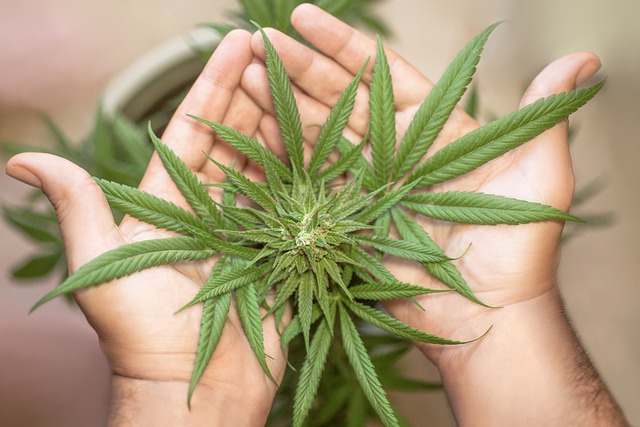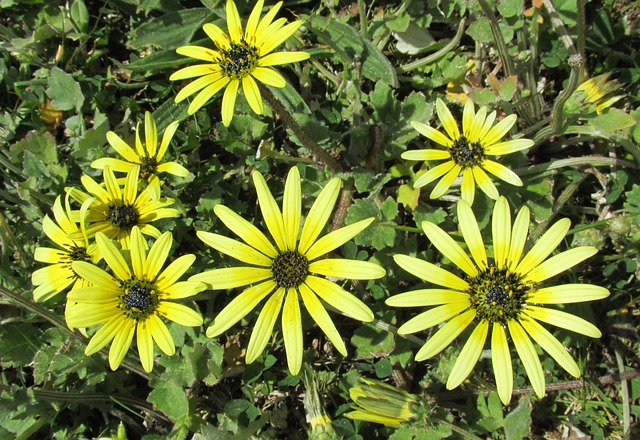
The THCA flower, a non-psychoactive form of cannabis, possesses distinct terpene profiles that contribute to its unique flavors and significant therapeutic benefits. These terpenes work synergistically with THCA to enhance the entourage effect, offering potential health advantages beyond what individual compounds could achieve alone. Myrcene is notable for its relaxing properties and is believed to amplify the effects of THC, while caryophyllene offers anti-inflammatory and antimicrobial benefits, particularly for conditions like arthritis and gastrointestinal issues. Limonene's presence may help improve mood and alleviate stress. The therapeutic potential of THCA flower terpene profiles is an area of growing research interest, with studies aiming to understand their interaction with the endocannabinoid system for promoting wellness. Consumers are encouraged to consider the specific terpene composition of different THCA flower strains to tailor its use to their individual health goals, highlighting the importance of understanding these compounds for informed decision-making in cannabis-based therapies.
Discover the multifaceted benefits of THCA flower, a cannabinoid-rich botanical offering unique therapeutic potential. Its distinct terpene profiles are the focus of this exploration, revealing how these compounds contribute to the plant’s health-enhancing properties. Dive into the article to uncover the secrets behind THCA flower and its beneficial compounds, including a comprehensive examination of its terpene profiles and how they can be harnessed for optimal wellness effects.
- Unveiling the Therapeutic Potential of THCA Flower Terpene Profiles
- A Closer Look at the Beneficial Compounds in THCA Flower: Terpenes and Beyond
- Maximizing Health Benefits with THCA Flower: Leveraging Its Unique Terpene Composition
Unveiling the Therapeutic Potential of THCA Flower Terpene Profiles

THCA, or Tetrahydrocannabinolic Acid, is a non-psychoactive precursor to THC, the primary psychoactive component found in cannabis. The therapeutic potential of THCA flower is largely attributed to its unique terpene profiles. These terpenes are aromatic compounds that contribute not only to the distinctive scents and flavors but also to the entourage effect, a concept suggesting that the combined effects of cannabinoids and terpenes are greater than their individual effects.
Research has indicated that THCA flower terpene profiles can vary significantly between strains, influencing both the aromatic experience and the potential therapeutic benefits. For instance, myrcene is commonly found in high concentrations in many cannabis varieties and is believed to enhance the psychoactive effects of THC while also offering its own therapeutic properties, such as anti-inflammatory and pain-relieving effects. Caryophyllene, another prominent terpene, possesses both anti-inflammatory and antimicrobial properties, making it a potential candidate for treating conditions like arthritis and gastrointestinal disorders. Additionally, limonene has been studied for its mood-boosting effects and its role in stress relief, further expanding the spectrum of benefits associated with THCA flower terpene profiles. These compounds work synergistically with THCA to modulate various physiological processes, offering a wide array of potential therapeutic applications that are currently under investigation.
A Closer Look at the Beneficial Compounds in THCA Flower: Terpenes and Beyond

THCA flower, a non-psychoactive cannabinoid found in the unrefined form of CBD (cannabidiol), has garnered attention for its potential wellness benefits. At the heart of its therapeutic potential are its unique terpene profiles. Terpenes are aromatic compounds that contribute to the distinctive flavors and fragrances of cannabis plants, but their role extends beyond mere sensory experiences. These chemical constituents synergize with THCA and other cannabinoids to modulate various physiological processes in the body’s endocannabinoid system. Each strain of THCA flower presents its own distinctive terpene composition, which can influence its effects and potential health benefits. For instance, myrcene is known for its sedative properties, while limonene may offer mood-enhancing and anti-inflammatory effects. The synergy between THCA and these terpenes can enhance the overall efficacy of the cannabis plant, suggesting that the entourage effect plays a crucial role in determining the therapeutic potential of THCA flower. As researchers continue to explore the intricate relationship between THCA, terpenes, and human health, the scientific community is uncovering a wealth of possibilities for how these compounds might be harnessed to support well-being. Understanding the terpene profiles of different THCA flower strains allows consumers and healthcare providers to make informed decisions about their use in various wellness routines.
Maximizing Health Benefits with THCA Flower: Leveraging Its Unique Terpene Composition

THCA flower, or tetrahydrocannabinolic acid flour, is garnering attention for its potential health benefits, which are thought to arise from its unique terpene profiles. These terpenes, the aromatic compounds found in the cannabis plant, not only contribute to the distinct flavors and scents of THCA flower strains but also play a synergistic role with cannabinoids like THCA to enhance their effects. For instance, the terpene profile of a strain can influence its anti-inflammatory properties or its potential to support the body’s response to stress. To maximize the health benefits of THCA flower, understanding and leveraging these terpene profiles is crucial. Consumers seeking the therapeutic advantages of THCA flower should consider the specific terpene composition of each strain, as this can affect the overall experience and efficacy. Myrcene, for example, is known for its relaxing effects and may enhance the pain-relieving qualities of THCA when present in higher concentrations. On the other hand, limonene’s citrusy terpene profile is associated with mood elevation and could be particularly beneficial for those looking to improve their mental well-being. By selecting strains with terpene profiles that align with their health goals, individuals can tailor their THCA flower use to better suit their needs and enhance the potential therapeutic benefits.
In conclusion, the therapeutic potential of THCA flower, particularly its unique terpene profiles, offers a promising avenue for natural wellness. The intricate interplay between the various compounds within THCA flower has been shown to exert significant health benefits, as explored in ‘Unveiling the Therapeutic Potential of THCA Flower Terpene Profiles’ and ‘A Closer Look at the Beneficial Compounds in THCA Flower: Terpenes and Beyond.’ By understanding and utilizing these compounds effectively, individuals can harness the advantages outlined in ‘Maximizing Health Benefits with THCA Flower: Leveraging Its Unique Terpene Composition.’ As research continues to evolve, the role of THCA flower terpene profiles in promoting health and well-being is becoming increasingly clear.







